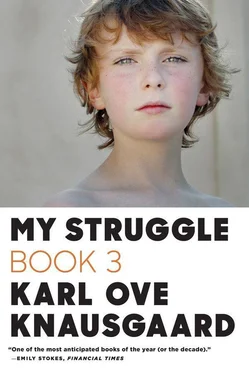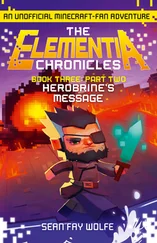Yes.
Yes.
“There we are,” he said, throwing over the last four. “That’s us finished.”
I followed him without a word, took off my boots and my coat and hung it up, went upstairs, gathered from the noise in the living room that Yngve was watching the match, and went into my room.
I sat down at my desk and pretended to read.
Just so that he got the message.
He did. A few minutes later he opened the door.
“The match has started,” he said. “Come on.”
“I don’t want to see it,” I said, without meeting his eyes.
“Are you being headstrong now?” he said.
He came into the room, grabbed my arm, and dragged me to my feet.
“Come on,” he said. He let go of my arm.
I stood still.
“I DON’T WANT TO SEE THE MATCH!” I said.
Without another word, he grabbed my arm again and dragged me crying out of my room, through the hall, and into the living room, where he hurled me onto the sofa next to Yngve.
“Now you sit there and watch the game with us,” he said. “Have you got that?”
I had thought of closing my eyes if he forced me into the living room, but now I didn’t dare.
He had bought a bag of glacier mints and a bag of English chocolate toffees. The toffees were my favorite, but the glacier mints were good as well. As usual, he had the bags next to him on the table. Now and then he threw one to me and Yngve. Today he did the same. But I wouldn’t eat them; I left them untouched in front of me. In the end, he reacted.
“Eat your candy,” he said.
“I don’t feel like them,” I said.
He stood up.
“Now you eat your candy,” he said.
“No,” I said, and started crying again. “I don’t want to. I don’t want to.”
“Now you EAT them!” he said. He grabbed my arm and squeezed.
“I-don’t-want-any … candy,” I gasped.
He seized the back of my head and pressed it forward, almost down to the table.
“There they are,” he said. “Can you see them? Eat them. Now.”
“OK,” I said, and he let go. Stood over me until I had unwrapped a chocolate-coated toffee and put it in my mouth.
The next day we were going to Kristiansand to visit my father’s parents. We often did that on the Sundays when IK Start was playing at home. First of all, we had dinner there, then Yngve, Dad, and Grandad went to the match, sometimes Mom did as well, while I stayed with Grandma because I was too small.
Both Mom and Dad had put on better clothes than usual. Dad wore a white shirt, a brown tweed jacket with brown patches on the elbows, and light-brown cotton slacks, Mom wore a blue dress. Yngve and I wore shirts and cords, Yngve’s were brown, mine were blue.
Outside, the sky was overcast, but the clouds were of the fluffy whitish-gray variety that, while they may have shut out the sky, did not carry rain. The road was dry and gray, the gravel dry and blue gray, and the trunks of the pines standing tall at the top of the estate dry and reddish.
Yngve and I got into the back, Mom and Dad the front. Dad lit a cigarette before starting the car. I was behind him, so he couldn’t see me unless I leaned to the side. As we reached the crossroads below the slope up to Tromøya Bridge I folded my hands and said to myself, “Dear God, please don’t let us crash today. Amen.”
I prayed like this whenever we went on longer trips because Dad drove so fast, he was always above the speed limit, always overtaking other cars. Mom said he was a good driver, and he was, but every time the car accelerated and we crossed the white line, a feeling of terror took me in its grip.
Speed and anger went hand in hand. Mom drove carefully, was considerate, never minded if the car in front was slow, she was patient and followed. That was how she was at home as well. She never got angry, always had time to help, didn’t mind if things got broken, accidents happened, she liked to chat with us, she was interested in what we said, she often served food that was not absolutely necessary, such as waffles, buns, cocoa, and bread fresh out of the oven, while Dad on the other hand tried to purge our lives of anything that had no direct relevance to the situation in which we found ourselves: we ate food because it was a necessity, and the time we spent eating had no value in itself; when we watched TV we watched TV and were not allowed to talk or do anything else; when we were in the garden we had to stay on the flagstones, they had been laid for precisely that purpose, while the lawn, big and inviting though it was, was not for walking, running, or lying on. Yngve and I had never celebrated a birthday at home, and that was rooted in the same logic, it was unnecessary, a cake with the family after dinner was sufficient. We weren’t allowed to have friends at home and that was also another aspect of the same logic, because why would we want to be indoors, where we only made a mess and created havoc, when the world outside existed? Our friends would have been able to tell their parents how we lived, and that may well have been a factor; actually the same logic applied here, too. Actually it explained everything. We weren’t allowed to touch any of Dad’s tools, not a hammer, not a screwdriver, not a saw or a pair of pliers, a snow shovel or broom, nor were we allowed to cook in the kitchen, nor even cut a slice of bread, nor switch on the TV or radio. If we had been allowed to do that, the house would have been turned upside down, whereas the way it was organized now everything was orderly, as it should be, and if anything was used, by him or Mom, it was done in a methodical, appropriate fashion. It was the same with driving: he wanted to progress as speedily as possible, with the fewest possible hold-ups, from one point to the next. In this case, from Tromøya to Kristiansand, the hometown of this thirty-year-old schoolteacher.
Time never goes as fast as in your childhood; an hour is never as short as it was then. Everything is open, you run here, you run there, do one thing, then another, and suddenly the sun has gone down and you find yourself standing in the twilight with time like a barrier that has suddenly gone down in front of you: Oh no, is it already nine o’clock? But time never goes as slowly as in your childhood either, an hour is never as long as it was then. If the openness is gone, if the opportunities to run here, there, and everywhere are gone, whether in your mind or in physical reality, every minute is like a barrier, time is a room in which you are trapped. Is there anything worse for a child than to sit in a car for a whole hour, on a journey he knows inside out, on the way to something he’s looking forward to? In a car full of cigarette smoke from two parents and with a father who hisses with irritation every time you shift position and happen to nudge his seat with your knee?
Oh, how slowly time went. Oh, how slow the landmarks were in appearing outside the window. Up the steep hill from the center of Arendal, through the residential district to Hisøy Bridge, along the whole length of the island coastline, past Kokkeplassen Sanatorium, where Mom worked, down the hill and past the shops there, over the bridge crossing the Nidelva River, and then the endless plains with houses and woods and fields to Nedenes. We weren’t even in Fevik yet! And from there it was still a long way to Grimstad, not to mention how far it was from Grimstad to Lillesand, and from Lillesand to Timenes, and from Timenes to Varodd Bridge, and from Varodd Bridge to Lund …
We sat at the back, silent, gazing out at the varied rolling countryside the road wound its way through. Past straits with islets and skerries, into the dense forests, past rivers and waterfalls, residential and industrial quarters, farms and fields, all so familiar that at any moment I knew what was coming next. Only when we drove past the zoo did we emerge from our torpor because who knew whether an animal or two might appear from behind the tall, long wire fences, free of charge! Then we were past it, and we sank back into our torpor. For an hour we sat in the back seat without moving, for an entire endless hour, before the town began to take shape around us, and the center of gravity shifted from the car journey to our imminent visit to our grandparents. Entering the town was like entering time, the clock started ticking again, there was the Oasen shop, further down our cousins, Jon Olav and Ann Kristin, the children of Mom’s sister, Kjellaug, and her husband, Magne; there were the chestnut trees along the road, the tall, dirty brick buildings behind them, there was the chemist, there was the kiosk they called Rundingen, there were the traffic lights, there was the music shop, there were the white timber houses, there was the narrow road, and then, all at once on the left-hand side, Grandma and Grandad’s yellow house.
Читать дальше












